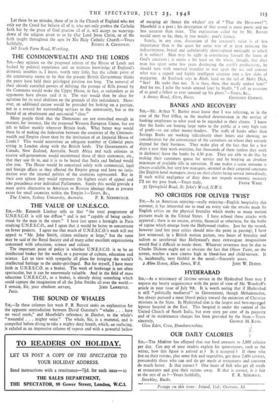THE VALUE OF U.N.E.S.C.O.
Snt,—Mr. Kenneth Lindsay tells us that " the total programme of U.N.E.S.C.O. is still too diffuse" and is not " capable of being under- stood by the man in the street." I have just spent a fortnight in Paris studying U.N.E.S.C.O., and I agree that it would be better to concentrate on fewer projects. I agree too that much of U.N.E.S.C.O.'s work will not appeal to "Mr. John Smith, citizen ordinary at large," but the same may be said of the Royal Society and of many other excellent organisation4 concerned with education, science and culture.
The important point of policy is whether U.N.E.S.C.O. is to be an intellectual broker for the world, or a purveyor of culture, education and science. Let us view with sympathy all plans for bringing the world's intellectual heritage to the under-privileged. But for myself, I have more faith in U.N.E.S.C.O. as a broker. The work of brokerage is not often spectacular, but it can be enormously valuable. And in the field of mass education U.N.E.S.C.O., as a broker, is already doing something which could capture the imagination of all the John Smiths all over the world:—


































 Previous page
Previous page